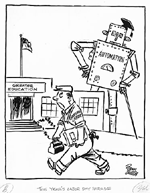 Despite the increased earning potential of many Canadians after the
war, the labour movement continued to face serious challenges.
Within the public service, for example, increased technology cast
a shadow over job security for workers in much the same way that
it had threatened craft workers in the late nineteenth century.
Machines were once again replacing workers, or "devaluing" their
jobs.
Despite the increased earning potential of many Canadians after the
war, the labour movement continued to face serious challenges.
Within the public service, for example, increased technology cast
a shadow over job security for workers in much the same way that
it had threatened craft workers in the late nineteenth century.
Machines were once again replacing workers, or "devaluing" their
jobs.
|

|
|
|
|
While recognizing the positive aspects of mechanization in reducing
the employer's cost," the union charges that "mechanization and automation
can create a decline in the number of employees, changes in skills,
transfers from service locations, as well as an increase in night work, or
work with inconvenient hours."
The union statement argues that "given its social and psychological
impact, higher productivity, alone, is not enough to justify the
introduction of large-scale mechanization."
Excerpt from: May-June issue of the Canadian Union of Postal Workers
as quoted in Technological Change and the Workforce, Robert M. Laxer,
ed. (Toronto: Ontario Institute for Studies in Education, 1978).
|

|

|
How did the
word processor change the workplace?
|
|
|
|

|
|